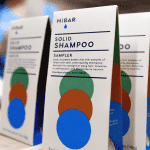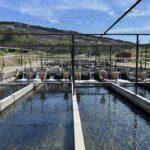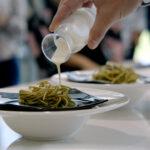The Future of Beauty
What goes on your body is just as important as what goes in it. From requiring producers to list ingredients on their packaging to banning 180 + ingredients, our beauty standards go above and beyond.
“Every risk that we take that doesn’t work out means that we’ve learned things that we get to apply to the next project.“
Casey Gaston, Senior Category Merchant, Whole Body
A Conversation with Marissa and Casey
What makes our Whole Body Department so unique?
Whole Story: Welcome, Casey & Marissa! Why don’t we start by having you introduce yourselves?
Casey Gaston: I’m Casey Gaston, and I’m a Senior Category Merchant focused on Strategic Seasonal Programs.
Marissa Norden: And I’m Marissa Norden, I’m the Category Manager for Bath & Body.

WS: Why don’t y’all start by giving us an overview of the state of the beauty industry?

CG: The first thing to say is that the beauty industry is always changing. I think that the big difference is that now you see claims about natural and organic becoming a lot more commonplace, and that paying attention to ingredients and the environment are kind of baseline expectations of customers now. What’s different at Whole Foods is that our standards are industry leading, meaning that we ban over 180 different ingredients in our body care. We have organic labeling standards where organic claims have to be certified by a third-party certifier. And we’ve done things like leading the industry in meeting Hawaii’s ban on certain sunscreen ingredients related to environmental concerns.
WS: So, when there’s no outside agency forcing us to label our products like that or get the certifications or pursue those higher standards, why go through the trouble?
MN: We go through the trouble because it aligns with the Whole Foods Market mission and values, first and foremost being that our purpose is to nourish people and the planet. We have a renewed focus in 2022 and beyond to make sure that is at the forefront of our assortment decisions.

CG: Leading the industry and setting Quality Standards has been built into the DNA of who we are since we opened our first store; that’s who we are.
WS: Do you think that there is a special connection between body care and beauty and that idea of higher standards and safer products?
MN: I think so. We’re also in this unique space where our shoppers are expecting it. They want to create wellness holistically; not only what they’re eating, but also what they are putting on their face and body. That’s where we’re raising the bar.
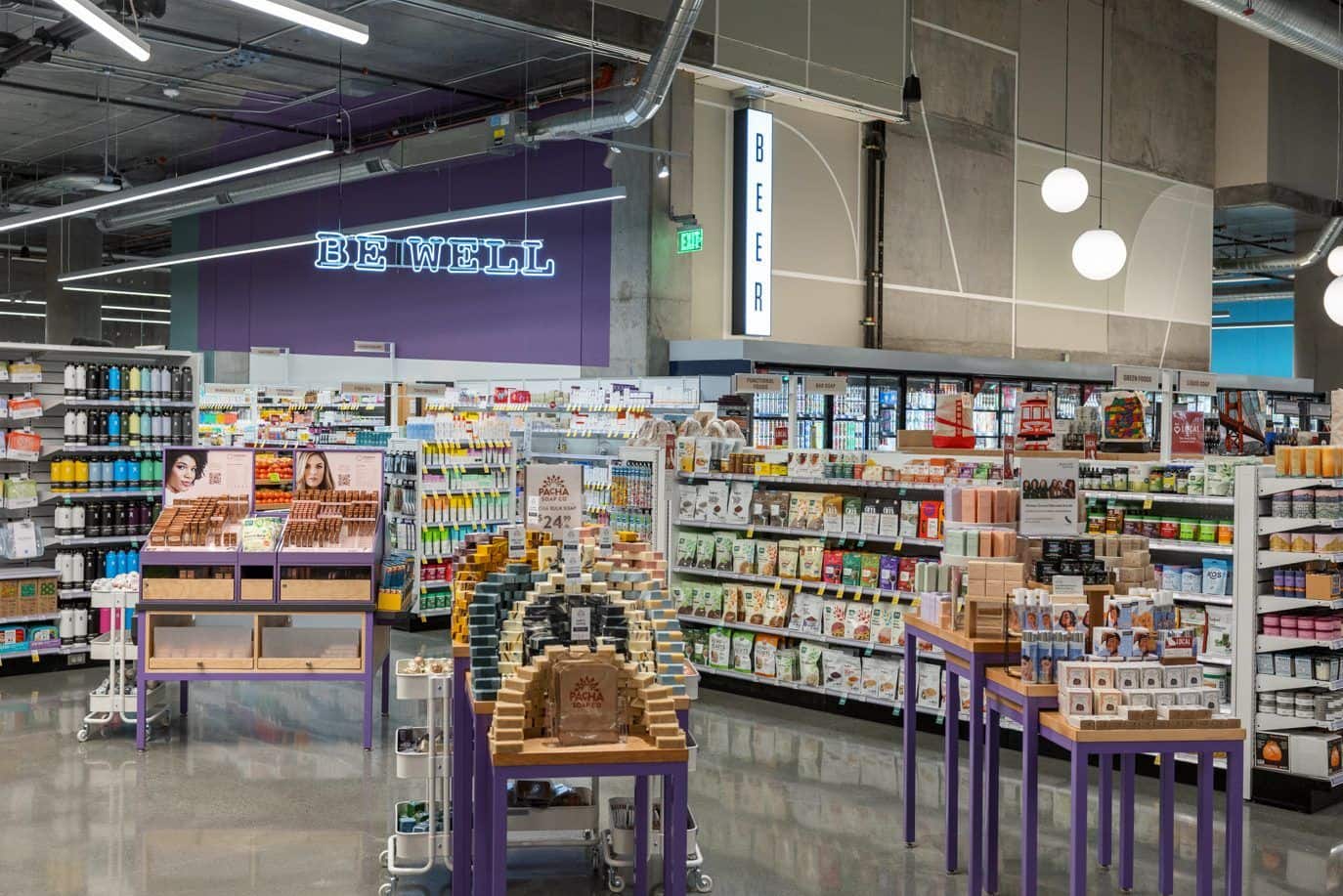
WS: How do you identify suppliers that align with those larger goals?
CG: I think it starts with transparency and authenticity. We want to be leading the industry and what that requires is suppliers that are able to substantiate the kinds of claims they’re making on their labels; whether that’s the ingredients, the packaging, the organic certifications, etcetera. Our customers are savvy; they know what those claims and those ingredients do, and they trust us to do the legwork with our suppliers. We also know that our customers are always looking for new and exciting things. So, we’re looking for suppliers that are innovating as well and bringing new ingredients, bringing new packaging formats, bringing new skin-application formats, whatever it is, to the industry, and we’re working with them to bring that to shelves. We want the efficacy of head-to-toe nourishment, and then we also want transparency of what went into those products.
WS: How does the relationship model that you have with suppliers support the work that you all do behind the scenes?
MN: We work with strategically aligned suppliers on innovation roadmaps that look one to five years out on concepts that might be missing in our assortments. We collaborate with them on new formats and new trending ingredients.

CG: And then, the fun part in product development and in these relationships is actually visiting some of them at the source whether it’s their manufacturing facilities or where they’re sourcing ingredients from, like essential oils or herbs and botanicals that are coming from around the world. We’ve been to all sorts of places to see how things are made and to understand firsthand the work that these companies are doing in the communities that they’re working in.
WS: What are you guys personally most excited about in terms of an upcoming trend or a new product?
CG: That’s a broad question because most immediately I’m very excited about the launch of Karuna, an independent brand, bringing all kinds of new ingredients that we haven’t seen before, like snow mushrooms, and red ginseng. Longer term, I think that I’m most excited about our ability to incubate and grow these brands. We have our new incubator program for Local brands, and we’re always working to find new brands to bring to the shelf first. That’s the most exciting thing; I may not know exactly what’s on the horizon, but I have more and more ways of getting in touch with these brands to bring them to Whole Foods Market.
MN: In Bath and Body, I’m looking forward to bringing more fun and discovery to the space. Beyond that, I’m most excited about all of the opportunities within packaging that takes the environment into account. We’re going to be extremely focused this year and beyond on innovating with our brands around packaging and looking at new alternatives to single-use plastic.
CG: We can explore new possibilities in this area and do something much further ahead of the curve than you might find in the regular retail space. Every risk that we take that doesn’t work out means that we’ve learned things that we get to apply to the next project. The suppliers that are with us, that are willing to take those risks, those are the ones that we have the most fun with. Every step of the way we’re testing and trying and smelling and travelling and doing all kinds of stuff.
WS: It seems like there must be a lot of trust there, between the team here at Whole Foods Market and that core group of suppliers.
CG: Trust is important; before we can take the risk, we have to build that trust, and so a lot of the work that we do with brands starts with incubation. Pacha is a really great example of that, of starting in one store in Omaha, Nebraska, and now there’s somebody who’s an incredible strategic supplier of ours, somebody that we can work with on these amazing everyday assortments, because we were able to incubate and grow with them.

WS: How would you like to see the beauty industry at large continue to evolve?
MN: There’s two spaces that I would love to see further evolution in the Beauty industry. One, a focus on true inclusivity and democratizing Beauty for All. We want to focus on inclusive, diverse brands; brands that really appeal to all. We want all our shoppers to feel like they belong in our wellness & beauty (Whole Body) department. Second, I’m excited about the evolution in packaging for our incredible products. There’s going to be a lot of innovation on that front. I do believe that our shoppers are wanting this from us, expect it from us, and we should be leading the way around eliminating some of this single-use plastic in our stores.
CG: The pillars of our strategy really are: seeking out innovation, seeking out advancement in sustainability, focusing on well-being holistically so that it’s not just making yourself pretty or trying to avoid aging, but actually nourishing yourself head to toe. There’s a lot more room for inclusivity and diversity in the beauty industry. To thrive in all the stages of life and really focus more on everybody’s radiance, everybody’s body care, everybody’s well-being. That’s a fun place to be.
Some of our favorite beauty suppliers
Alaffia

Alaffia is a social enterprise invested in creating plant-based bath and body care formulations that are made using fair trade base ingredients like shea butter and coconut oil from Togo, West Africa. Alaffia product sales fund various Empowerment Projects in Togo, helping members of those communities, primarily women, share their skills and gain access to quality healthcare, education, and economic independence by participating in the global trade market. In turn, the rest of the globe now enjoys the benefits and wisdom of traditional handcrafting methods infused with care. Each indigenous West African ingredient that’s poured into Alaffia products imparts a taste of tradition. Alaffia continues to formulate new innovations using its flagship product of Authentic African Black Soap. From all-in-ones to scalp care and our extra moisture hair care regimen – Alaffia is already planning what’s next.
Weleda

Weleda was founded in 1921 in Switzerland, grounded in the belief that people are an intrinsic part of nature’s fabric. Carefully studying plants and their properties since day one, Weleda thoughtfully crafts skincare products that harness the vitality of nature and work in harmony with the body’s own restorative abilities. Weleda firmly believes that the power of the world can help to balance mind, body and spirit.
In the past century, Weleda has cultivated a global farming community, focusing on encouraging their ingredient suppliers to adopt practices that respect the environment. In 2021, Weleda became B-Corp certified, meeting high standards of social and environmental performance while balancing profit and purpose.
Since its inception, Weleda has focused on respecting the environment. As Weleda grows, it continues to focus on nourishing the planet with a spotlight on connecting consumers to a natural world where biodiversity thrives.
Derma E

DERMA E specializes in beauty products that are dermatologist recommended, clinically proven, and made using vegan formulas that do not contain parabens, sodium lauryl sulfates, petrolatum, mineral oil, gluten or soy. They care about what people put on, and in, our bodies— and about what eventually ends up in our waters and ecosystems. Their packaging components are recyclable, and they aim to offset their conventional electricity use with wind energy certificates. Their commitment to clean beauty is not just to their customers, but also to the planet. DERMA E has committed to the recovery and collection of 10,000 pounds of ocean-bound plastic! Their contributions will help support the environment and create good jobs in the global south.
Intro to Our Beauty Standards
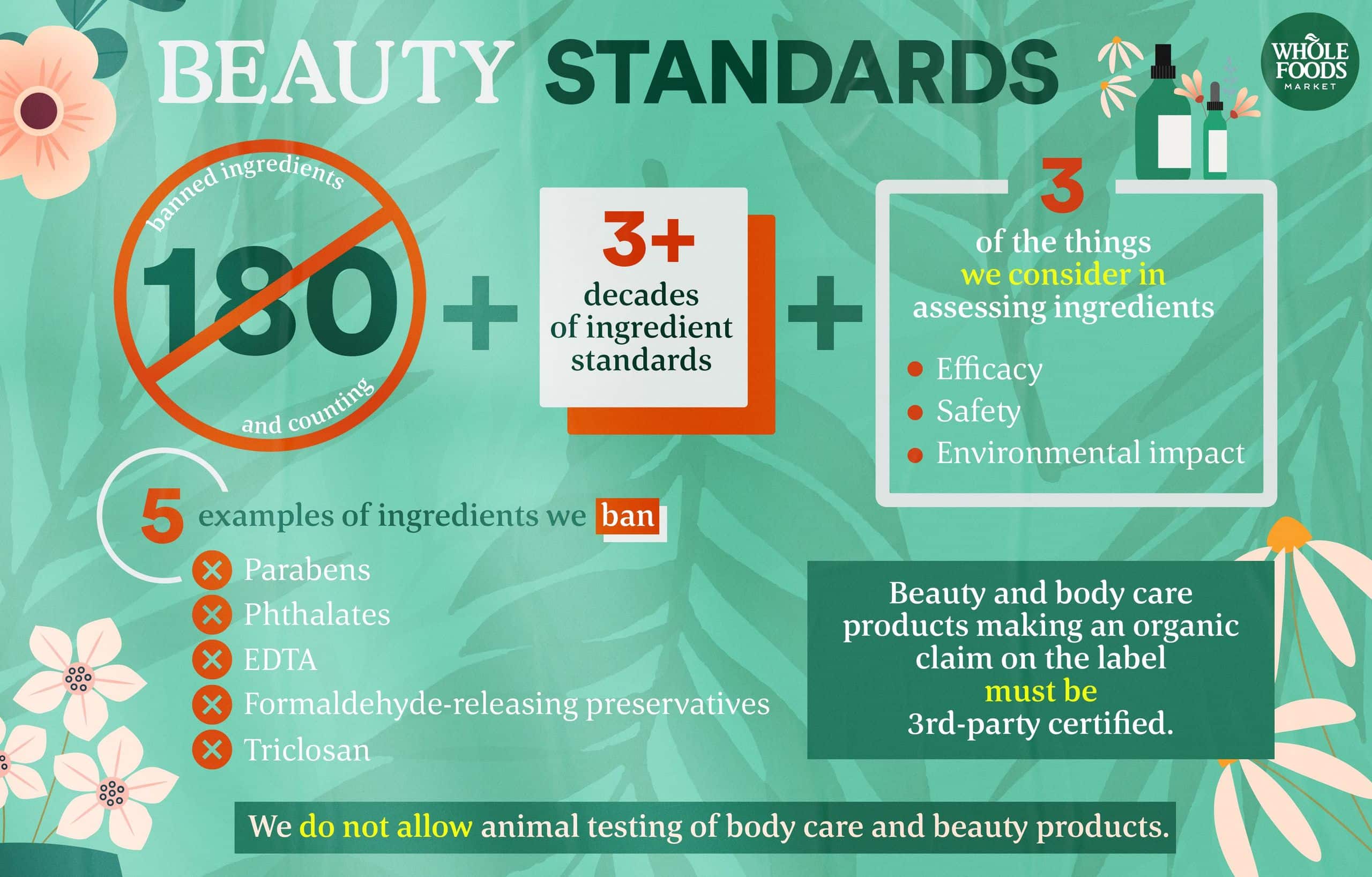
Supplier in-depth: Linda Wang from Karuna

Whole Story: Tell us who you are and what you do.
Linda Wang: My name is Linda Wang; I’m the founder of two skincare brands, Karuna Skin and Avatara. Karuna Skin started in 2009 as the first sheet mask brand launched in the US. It was created through a personal journey; as a child, I suffered from skin issues, and later, discovered that I had eczema. My parents took me to many doctors and finally landed on an Eastern doctor, who would change my life. The doctor mixed this magical herbal ointment and asked me to put it on my rash, then instructed me to wrap a plastic wrap around the rash at night so the ointment wouldn’t evaporate or rub off during my sleep. Within days my rash went away. I was amazed by that experience, and it stuck in my head. Before starting my brand, I was a fashion buyer for over 10 years. I was used to spotting and predicting trends. During that time, I took many trips to Asia, and on a trip back to my homeland, Taiwan, I discovered that the sheet mask application was widely used there. I realized the application concept was very familiar. I connected it back to my childhood experience, realizing the mask fiber acts as a barrier on your skin, like the plastic wrap my doctor asked me to use. So that’s how I started Karuna. We recently launched a simple topical skincare line with Whole Foods Market nationwide by mixing Chinese medicinal herbs, Ayurvedic practices from India, adaptogens, and blending it with Western clinical science ingredients to achieve skin’s optimal balance.

WS: What is the guiding philosophy behind the brands and the companies that you’ve started?
LW: The philosophy is really about getting balanced, which is really important. Karuna means “compassion” in Sanskrit, and I’ve always taken that approach in life. You need to put a compassionate force behind anything you care about. That could be giving yourself some alone time to recharge, like self-care, working out, taking care of your body, etcetera. By doing so, you’re being compassionate to yourself and others because you’re presenting the best version of yourself. So, the brand’s primary focus and principle are that. Anything we create and put out there is done with a compassionate heart.

WS: You mentioned the name is from Sanskrit. Where did that inspiration come from?
LW: I grew up as a Buddhist. All those philosophies of Buddhist practice were instilled in me at a very young age. So, there’s always that sense of peace I feel when I go into a temple. I picked up a Dalai Lama book, and the word Karuna just jumped out at me. I love the meaning behind the word, and I loved the rounded sound, which really attracted me to the word Karuna.
WS: How did you kind of develop your first formulations and the combination of the four principles?
LW: In Taiwan, Chinese medicine is as essential as western medicine. When you get sick, you’ll see a Western medicine doctor, and also it’s equally important to see an Eastern doctor to rebalance/realign your body. When I created the Balancing Collection, I decided to use eastern ingredients. Some of which I already knew, like snow mushrooms. Many thousands of years ago, Empresses would drink and eat snow mushrooms to help boost collagen production and brighten skin. A lot of those herbs were something that I was already familiar with; just taking a deeper dive and understanding what that can do for you once it’s blended into a topical skincare formula. So that’s really my inspiration; just grabbing them from my memory bank and researching a little further.
WS: What about the Ayurvedic components? It seems different from Eastern medicine.
LW: Both of these practices came from Asia, so there are a lot of shared ingredients. What I found out through my research is a lot of those ingredients are used in Chinese medicine; they actually have common ground. They use similar ingredients.

WS: Do you think it’s fair to say that a foundational principle for Karuna is that idea of taking the best of Western-style clinical process and finding a way to combine that with the best of the more traditional medicinal practice?
LW: We really took a deep look at our formulas one by one to identify what we want those products to do for your skin. If it’s for boosting hydration, we’ll find Ayurvedic or Traditional Chinese Medicine ingredients and then use Western clinical science ingredients to boost that hydration level. That’s how we pair everything together; just by looking at its benefits and properties.

WS: What did it feel like in your early days of Karuna, when you were having some of those first successes, overcoming the challenges?
LW: When you first start a company, it starts off as a concept in your mind. So often it’s tough for people to take you seriously because they’re thinking, “Is she really going to pull it off, or is this just an idea that she talked about?” So, you have to fight these external judgments and show that you can actually carry it through. Being extremely disciplined is the key. Only you can make your concept into reality, so you need to treat it as if the business is already running. When I first started Karuna, I was working out of my condo. I would still get up every morning, get ready, go upstairs and work. There weren’t many things happening then, but I created work and a consistent schedule to feel real.
There were many moments of success. The first surreal moment was when products first arrived; I remembered being like, “Wow, this is real!”

The next moment was when we got into a retail store, standing there and looking at your products on the shelf; that was another surreal moment. Being mentioned in a national magazine was another one. Eventually, I feel like those surreal moments never end; you just continue to scale bigger and bigger to recreate those moments. In fact, I’m having another one right now. When I walked into a Whole Foods Market store and saw my products on the shelf. That is another big moment, so yeah, it never ends! Challenges come every day. You have to work through them and persevere. I have a rule for myself. I allow myself only one week to feel bad in moments of despair then bounce back after that.
WS: How did you want Karuna to be different from other brands?
LW: I think it’s really important to look at our overall philosophy. Every day, many factors could influence your skin; if you didn’t drink enough water, didn’t get enough sleep the night before, or didn’t eat well. Those could all be factors that contribute to skin issues. So, what we’re really setting out to do is combine the best practices from around the world. This is why these holistic approaches have been around for thousands of years. It’s blending all the best of the best from around the world into one formulation. The message here is to focus on balance and overall skin health instead of addressing a singular skin issue. What I love about the current beauty space is it’s beauty for all, skincare for all. I love the current dialogue and conversation surrounding individualism and equality, especially with the new generation. I think that’s great because they’re the future. They’re going to advance us into a better world. Karuna’s point of difference is to offer great skincare products at accessible prices and to have a compassionate force in everything we create. There are a lot of great products in the beauty space, no doubt. But it can also get costly! So, I wanted to bring great quality skincare products that don’t need to break the bank.
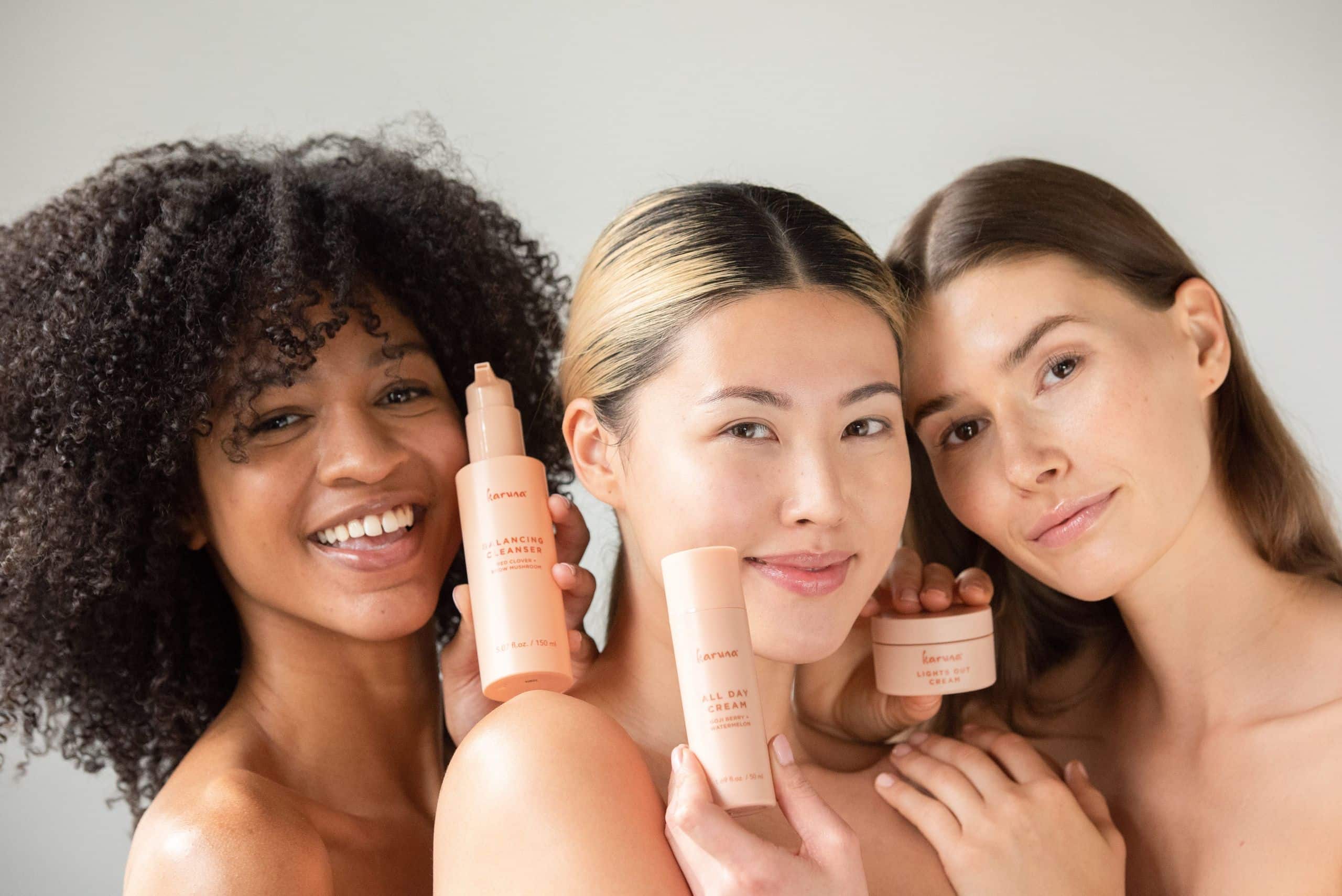
WS: If you can’t participate because you can’t afford it, then all that hard work is kind of meaningless.
LW: Yeah, exactly, and I think consumers are smarter now! Like before in the beauty space, our grandma’s generation would buy the entire brand, like, A to Z, like, cleanser all the way to night cream. But now people are more educated; they want to try new things, and then there is that fun factor of mixing different brands! So, I feel like everybody should enjoy it; they should try a little bit here, a little bit there, and find their favorites.
WS: Tell us about the relationship with Whole Foods Market and how it helped grow your company.
LW: The relationship has been amazing and excellent in every way! When I created this skincare system, the first retailer I had in mind was Whole Foods Market. They have set the standard for clean beauty. Clean beauty wasn’t a thing when I first started 12 years ago, but it has become the norm today. Whole Foods Market is the pioneer in this area, so for me to partner with them was a dream come true. We want people to know that our formulations are transparent and effective, and now we have products on Whole Foods Market’s shelves.

WS: What are your hopes for the future of Karuna?
LW: Lots of hope! We just launched and are currently still gathering data to see what people like. We are happy with our performance so far, and we are looking forward to continuing to grow the business with Whole Foods Market by creating more brand awareness, converting more customers, etcetera. We’ve already had a great start, but how do we keep building more momentum? The future is to continue offering a great assortment in skincare and staying true to our brand and the mission.
Linda’s guide to Slugging
What is slugging? Referencing the shiny stickiness of a slug, this K-beauty trend is everywhere on social media. Essentially it means applying an occlusive barrier to your skin overnight as a last step to your beauty routine. Read on for Linda’s Karuna-inspired spin on this viral beauty sensation!

First, properly cleanse your skin with Karuna’s Balancing Cleanser, then sweep away the excess debris and oils with our Radiance Toner.

After the skin is dry, dab a little Wake Up Eye Cream to nourish the delicate eye area.

Next, apply Lights Out Cream to hydrate and rejuvenate your skin from the day.

Lastly, apply Sleeping Mask generously – Shea Butter can act as an occlusive barrier to lock in the skin moisture to achieve slugging!

